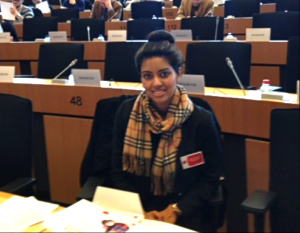Jasmine Alam
 1) What is your official current position and title?
1) What is your official current position and title?
I am currently a part-time instructor in the economics department and faculty of business at the University of New Brunswick. I am a PhD Candidate.
2) What is your educational background?
I hold a BA in Economics and an MA in Public Policy. My PhD level coursework has been completed at the University of New Brunswick and I am currently continuing additional coursework at Oxford University.
3) Talk a little about your career path? Where did your passion for the research/work that you do originate and how did it develop?
There are many reasons for which I chose this career path. As a child, I always saw PhD students around because almost all of my family members hold positions in academia. Growing up in this environment definitely influenced my decision to pursue higher-level studies.
My passion for my research topic started about 7 years ago. In 2006 Dr. Muhammad Yunus won the Nobel Peace prize and I recall watching the video of the ceremony at my grandparents’ home. After completing my undergraduate degree, I travelled to the UK in 2007 to pursue my Master’s from King’s College in Public Policy. While taking courses at the London School of Economics and King’s College, I had the “opportunity of a lifetime” to see Dr. Yunus speak on building social business. After the inspiring talk he delivered, I immediately changed my dissertation topic from “Three Essays on Fiscal Federalism” to “Micro-credit and Its Impact on Poverty and Women’s Empowerment in Bangladesh”. After completing my Master’s, I took up a position in the corporate world but social business was always in the back of my mind. I had many questions and ideas on how the micro-credit model could be initiated in industrialized countries. This is how the idea of the pilot project for micro loans in Canada developed. In the end, I always knew I wanted to do work towards the eradication of poverty and to also help carry out Dr. Yunus’ vision of building a poverty museum by 2050.
4) Tell us about one or two of your current projects?
Access to credit is a challenge for many low-income individuals in Saint John, New Brunswick. Drawing from the Grameen Bank model, my PhD committee (Professors Rob Moir, Terry Conrod, Mustapha Ibn-Boamah) and I have developed a similar but adjusted model for the Canadian context. In essence, we are launching a pilot project within the Saint John Community Loan Fund. This project is designed to deliver micro loans in a group setting and will examine the impact on poverty rates and empowerment.
Initially, the specific target population will be women interested in creating or expanding upon small businesses. Loans will be provided without collateral to participants who are carefully selected to fund their start-up businesses, purchase items necessary for their businesses and ultimately generate income.
5) How do you see your research/work in terms of possibly contributing to evidence-based public policy?
This research contributes to evidence-based policy because it will demonstrate how micro-credit would work in the Canadian context and the policy adjustments needed when applying the Grameen-type lending model to these populations. It will also highlight how social return on investment can be measured and illuminate how government savings on social programs can be achieved through stylized market-based strategies. It is the first of its kind for the province and one of the first of its design in Canada. The results will provide evidence on how to build effective social policies to reduce poverty through creative use of the market. Moreover, lessons learned in the pilot project can be extended and applied to other provinces, which is of great interest and value.
6) Discuss any past achievements that were significant to your professional path? Have any contributed to the promotion of evidence-based public policy?
From my experience of working in a central government agency to completing my Master’s in public policy, there has been much work that have contributed to the advancement of evidence-based policy. My graduate program at King’s College was heavily focused on and devoted to the promotion of evidence-based policy. Even today, our pilot project will demonstrate the use of evidence-based policy in social policy formation.
7) Describe in a couple of sentences your involvement with NBSPRN and how your relationship with the Network has contributed to your research/work and/or to social/economic policy?
I have worked with the New Brunswick Social Policy Research Network and particularly with Nick Scott (Acting Executive Director) on a number of projects. I currently assist with coordinating the MBA internship program at the University of New Brunswick and each year we send a team of MBAs to assist the New Brunswick Social Policy Research Network on various projects. Our students have found the internship placements at the Network invaluable. Moreover, the Network is supportive of my PhD research and has awarded student grants. I am a very proud member of the Network. It has been a pleasure working with them and I know that our relationship will continue to grow.
8) Any last thoughts? Any additional information or anecdotes that you think would add interest or a personal touch, perhaps something that readers would not expect.
Andy Scott, Muhammad Yunus, Jack Layton, Michael Jackson, Oprah Winfrey, Mother Teresa, Bono, Jon Bon Jovi, Sir Fazle Hasan Abed (among others) all have one thing in common: Compassion. Compassion will make this world a better place for years to come.




